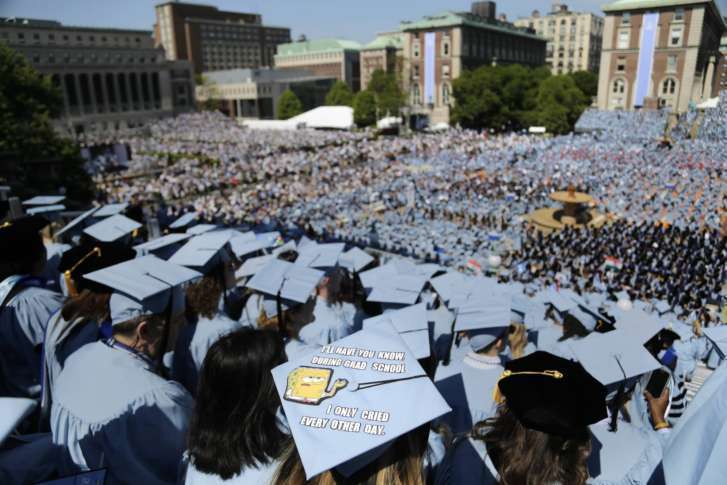
Companies that promise to slash your student debt have devised a new scheme, partnering with a lender that can force you to keep paying even after you discover the money isn’t going toward your loans.
Student debt companies, which say they will reduce or eliminate your loans for a fee, have flourished for years by making false promises to struggling borrowers.
Consumers can fight back by halting payments to the debt company and seeking legitimate help. But that’s not easy with the latest twist because a third party is involved.
Instead of being asked to pay fees to the debt company, borrowers say they unwittingly take out a loan from Equitable Acceptance Corp., a Minnesota-based company currently under investigation by the Federal Trade Commission.
The new loan, which is in addition to the student loan, covers the upfront and other fees charged by the original debt adjustment company. Upfront fees are illegal in some states. Debt companies avoid those restrictions by converting fees into loans.
The debt companies get paid by Equitable, and borrowers are stuck with a line of credit at 20% annual interest. Their agreements could cost them $1,800 or more over several years. Borrowers who stop paying can end up with damaged credit.
As for the student loans at the root of the problem? Borrowers say in complaints to federal regulators that they haven’t shrunk at all.
Hundreds of borrowers have filed complaints against Equitable with the Better Business Bureau and Consumer Financial Protection Bureau. Many have emailed NerdWallet, which posted a Student Loan Watch List last year with warnings about more than 130 student debt businesses.
Questionable ties
Equitable, which also finances uninsured medical services and consumer products, has been in business for more than 50 years. It entered the student loan industry in 2015.
Equitable has acquired the contracts of about 60,000 borrowers, says Daniel D. Hill, the company’s general counsel. Those contracts have come through partnerships with 43 student debt companies.
The FTC targeted several of those companies last year as part of a national crackdown on the student “debt relief” industry. So far, the FTC has sued seven student debt companies, alleging they charged borrowers illegal upfront fees to perform document-preparation services consumers could do themselves through the U.S. Department of Education.
NerdWallet has learned that investigators for the FTC and several state attorneys general have questioned Equitable about an increase in consumer complaints and its relationship with various student debt companies.
Equitable says the partner companies do not charge upfront fees and that it works to ensure that its partners are following the law. Equitable has stopped working with several dozen partners, some of which have gone out of business in response to the federal scrutiny, Hill says.
The company also disputes complaints that borrowers aren’t aware they are taking out a loan. Hills says its partners notify customers multiple times about the line of credit and require them to consent to doing business with Equitable before signing their contracts.
‘Beyond frustrating’
Borrowers who have tried to get out of their contracts with Equitable have found it difficult, according to written consumer complaints. At least 10% of Equitable’s customers, or more than 6,000 borrowers, have defaulted on the line of credit, Hill says.
Borrowers say Equitable collects on its debts aggressively.
Sara Carril, a 33-year-old art teacher in St. Louis, says she stopped paying Equitable after realizing the student debt company she signed up with had not provided the promised services.
Carril says the company, Student Advocates, told her it would lower the payments on $80,000 in student loans with Great Lakes Educational Loan Services. She made $39 monthly payments to Equitable for nearly two years, thinking she was paying off her student debt.
She says she learned this spring that the payments were not being applied to her student loans but to her Equitable debt. She tried to get out of her agreement, but says Equitable’s representatives told her she was obligated to pay. Equitable has since transferred her debt back to Student Advocates. She still owes $978.52.
Equitable reported her to the credit bureaus after she stopped paying, according to financial records she showed NerdWallet. She says the move dropped her credit score more than 100 points.
“It’s beyond frustrating,” Carril says.
Canceled contracts
The Missouri Higher Education Loan Authority, which services more than 2 million student loans, receives dozens of complaints about Equitable every month, says Scott Lause, its assistant general counsel.
“It’s the company our customers complain about the most,” he says.
The Missouri loan servicer, also known as MOHELA, sued Equitable and one of its partner companies, Mentor USA, last year, alleging that they conspired to hijack one of its customer’s accounts.
According to the suit in Missouri state court, an employee from Equitable or Mentor USA impersonated the borrower, who was not identified in the complaint, on three calls with the loan servicer.
The caller changed the password on the borrower’s account and canceled her direct-debit payments with MOHELA, the suit alleges.
Equitable has denied the allegations and filed a counterclaim against MOHELA, arguing that it has harmed Equitable’s business by telling its customers that student debt companies are scams.
Equitable says it has agreed to cancel the contracts of several hundred customers who claim they have been scammed.
“We don’t want the bad press,” Hill says. “We never ever had this kind of trouble until we got into this loan assistance business.”
Consumer recourse
Even if Equitable has played no part in schemes, legal experts say the company could face liability, potentially nullifying all of its agreements with consumers.
“Setting up a structure where you purchase these fraudulently obtained contracts doesn’t absolve you of all legal liability for the fraud,” says Persis Yu, a staff attorney with the National Consumer Law Center. “It’s absolutely absurd to think that they don’t know the kind of abusive practices they’re involved in.”
NerdWallet has sounded alarms for years about the student debt adjustment industry. Yet emails to NerdWallet and complaints to regulators show that companies continue to prey on borrowers.
Yu’s advice to anyone who has sought help and discovers Equitable is involved? Keep making monthly payments to avoid damage to your credit. If Equitable won’t let you out of your agreement, find a lawyer.
Contact your local bar association for a list of pro bono lawyers or legal services in your area, or search the attorney directory of the National Association of Consumer Advocates.
Source:-nerdwallet




